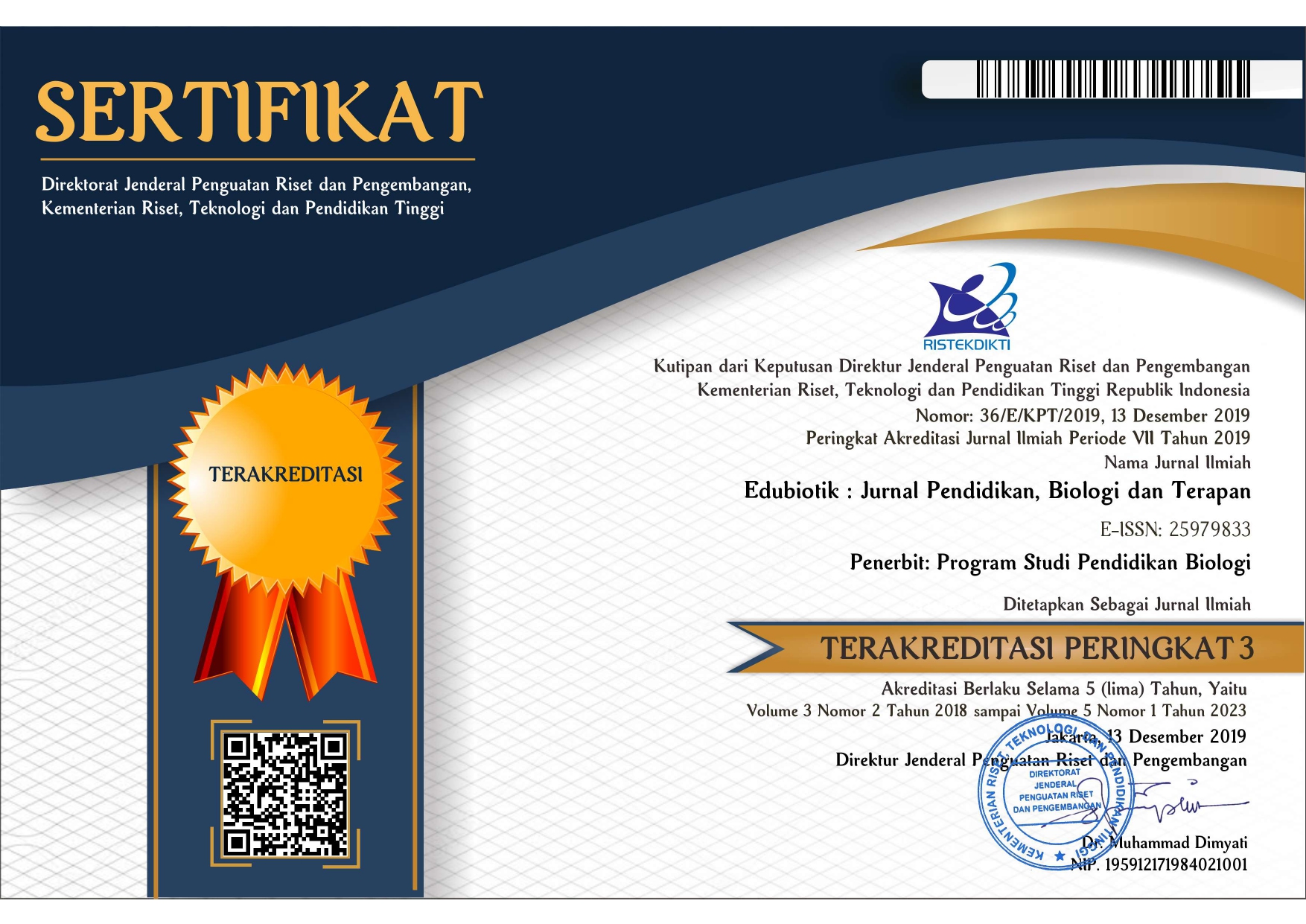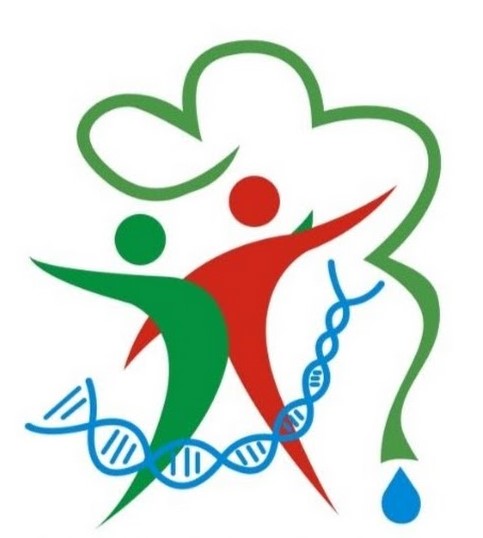Profile analysis of digital literacy skills of biology education students
Abstract
Today's world of higher education emphasizes the importance of digital literacy skills that cannot be underestimated. This study aims to investigate the state of digital literacy among students enrolled in the Biology Education Study Program at Universitas Negeri Malang, focusing on their proficiency in utilizing digital tools and resources, critically evaluating information, and responsibly navigating online domains. The study was a quantitative approach. Questionnaires with a Likert scale consist of 36 statements designed. Data were collected in the even semester of the 2023/2024 academic year from a total of 147 students. The research instrument adapted from validated sources assessed six key indicators of digital literacy (finding, using multiple sources, selecting, evaluating, considering sources effects, and using original work). These quantitative data were analyzed by descriptive analysis technique. The results showed that although most students obtained a moderate level of digital literacy (61.54%), there was a certain number of students with low (1.92%) and very low (0.96%) levels of digital literacy. These results suggest that more attention is needed to digital literacy development in biology education at all levels. These findings emphasized the importance of further and holistic empowerment of digital literacy skills among biology education students, particularly in evaluating and considering the source/effect of messages. Improvements in these areas and studies are critical to preparing students for academic and professional success and fostering their engagement with society in an increasingly digitalized world. Future research efforts should focus on implementing targeted interventions to improve digital literacy in programs and comparing the level of digital literacy across different biology education courses in different institutions. This study contributes to the ongoing discourse on digital literacy in higher education and underscores the need for adaptation and continuous improvement in educational strategies to meet the evolving demands of the digital age.
References
Baber, H., Fanea-Ivanovici, M., Lee, Y., & Tınmaz, H. (2022). A bibliometric analysis of digital literacy research and emerging themes pre-during COVID-19 pandemic. Information and Learning Sciences, 123(3), 214-232. https://doi.org/10.1108/ils-10-2021-0090
Bejaković, P., & Mrnjavac, Z. (2020). The importance of digital literacy on the labour market. Employee Relations, 921-932. https://doi.org/10.1108/ER-07-2019-0274
Bhat, R. A. (2023). Digital literacy development: Assessing the efficacy of online learning platforms in enhancing students' information fluency. International Journal of Social Science, Educational, Economics, Agriculture Research and Technology (IJSET), 2(9), 597–599. https://doi.org/10.54443/ijset.v2i9.221
Burton, L J., Summers, J., Lawrence, J., Noble, K., & Gibbings, P. (2015). Digital literacy in higher education: The rhetoric and the reality. Palgrave Macmillan, London. https://doi.org/10.1057/9781137476982_9
Caverly, D. C., Payne, E. M., Castillo, A. M., Sarker, A. L., Threadgill, E., & West, D. (2019). Identifying digital literacies to build academic literacies. Journal of College Reading and Learning, 49(3), 170-205. https://doi.org/10.1080/10790195.2019.1638218
Coffey, L. (2024). Colleges adding digital literacy as graduation requirement. https://www.insidehighered.com/news/tech-innovation/teaching-learning/2024/03/26/colleges-adding-digital-literacy-graduation
De la Hoz, A., Cubero, J., Melo, L., Durán-Vinagre, M. A., & Sánchez, S. (2021). Analysis of digital literacy in health through active university teaching. International Journal of Environmental Research and Public Health, 18(12), 6674. https://doi.org/10.3390/ijerph18126674
Dewanti, B. A., Santoso, A., & Septaria, K. (2021). Assessment of critical thinking skills in STEM-based science learning through project assignments. Proceedings of the 6th International Seminar on Science Education (ISSE 2020), 824-831. https://doi.org/10.2991/assehr.k.210326.119
Gibson, P. F., & Smith, S. (2018). Digital literacies: preparing pupils and students for their information journey in the twenty-first century. https://www.emerald.com/insight/content/doi/10.1108/ILS-07-2018-0059/full/html
Greenstein, L. (2012). Assessing 21st century skills: A guide to evaluating mastery and authentic learning. California: Corwin A Sage Company.
Guess, A. M., Lerner, M., Lyons, B., Montgomery, J. M., Nyhan, B., Reifler, J., & Sircar, N. (2020). A digital media literacy intervention increases discernment between mainstream and false news in the United States and India. National Academy of Sciences, 117(27), 15536-15545. https://doi.org/10.1073/pnas.1920498117
Haliq, A., Zamzani, Z., Wiedarti, P., & Akhiruddin, A. (2023). Self-acces in digital literacy: Evaluating the quality of information and reliability of sources in writing academic essay. Journal of Language, Literature,and Linguistics, 4(1), 85-96. https://doi.org/10.26858/interference.v4i1.44561
Hsiao, Y., & Shiao, Y. (2018). Research on gender differences in the digital learning performance of university students. Proceedings of the 9th International Conference on E-Education, E-Business, E-Management and E-Learning, 26-30. https://doi.org/10.1145/3183586.3183593
Isabel, Rodríguez-de-Dios., Juan, José, Igartua., Alejandro, González-Vázquez. (2016). Development and validation of a digital literacy scale for teenagers. Proceedings of the Fourth International Conference on Technological Ecosystems for Enhancing Multiculturality, 1067-1072. https://doi.org/10.1145/3012430.3012648
Khan, M. Y. (2018). New technologies and digital literacy in education: A shifting paradigm. Pakistan Social Sciences Review, 2(1), 108-118. https://doi.org/10.35484/pssr.2018(2-I)09
Kimbell-Lopez, K., Cummins, C., & Manning, E. (2016). Developing digital literacy in the middle school classroom. Computers in the Schools: Interdisciplinary Journal of Practice, Theory, and Applied Research, 33(4), 211–226. https://doi.org/10.1080/07380569.2016.1249731
Leliana, A., Harti, L. M. S., Zuhri, F., & Kusumaningtyas, D. C. S. (2021). Digital literacy: Text credibility on critical reading material. Journal of English Teaching Adi Buana, 6(1), 43-51. https://doi.org/10.36456/jet.v6.n01.2021.3512
Li, Y. (2012). Undergraduate students searching and reading Web sources for writing. Educational Media International, 49(3), 201–215. https://doi.org/10.1080/09523987.2012.738013
Maghfiroh, H., Zubaidah, S., Mahanal, S., & Susanto, H. (2022). Challenges and opportunities of learning biology in the post-covid-19 pandemic: A systematic literature review and thematic synthesis. Bioedusiana: Jurnal Pendidikan Biologi, 7(1), 18-42. https://doi.org/10.37058/bioed.v7i1.4816
Monteiro, A., Leite, C., Coppi, M., Fialho, I., & Cid, M. (2023). Education in emergency: Lessons learned about school management practices and digital technologies. Research in Educational Administration and Leadership, 8(1), 223-254. https://doi.org/10.30828/real.1134984
Morgan, A., Sibson, R., & Jackson, D. (2022). Digital demand and digital deficit: Conceptualising digital literacy and gauging proficiency among higher education students. Journal of Higher Education Policy and Management, 44(3), 258-275. https://doi.org/10.1080/1360080X.2022.2030275
Nazarova, E., & Nazarov, A. (2021). Digital literacy and the development of digital education. KnE Social Sciences, 168-174. https://doi.org/10.18502/kss.v5i2.8348
Nguyen, L. A. T., & Habók, A. (2024). Tools for assessing teacher digital literacy: a review. Journal of Computers in Education, 11(1), 305-346. https://doi.org/10.1007/s40692-022-00257-5
Rayendra, Abdulhak, I., & Rusman. (2020). Assessment of digital literacy competence for non-formal education study program students. Proceedings of the 4th International Conference on Learning Innovation and Quality Education, 1-4. https://doi.org/10.1145/3452144.3452242
Safitri, D. (2024). Mobile augmented reality genetics to improve students’ mastery of genetic concepts. TEM Journal, 13(2), 1399-1412. https://doi.org/10.18421/TEM132-54
Sayres, M. A. W., Hauser, C. R., Sierk, M., Robic, S., Rosenwald, A., Smith, T. M. F., Triplett, E. W., Williams, J., Dinsdale, E. A., Morgan, W., Burnette, J. M., Donovan, S. S., Drew, J. C., Elgin, S. C. R., Fowlks, E. R., Galindo‐Gonzalez, S., Goodman, A., Grandgenett, N F., Goller, C., . . . Pauley, M A. (2018). Bioinformatics core competencies for undergraduate life sciences education. PLOS ONE, 13(6), 1-20. https://doi.org/10.1371/journal.pone.0196878
Setiawan, D., Mahanal, S., & Zubaidah, S. (2021). RICOSRE: Effect and potential to enhance biology students’ digital literacy at Universitas Negeri Malang. AIP Conference Proceedings, 2330(1). AIP Publishing. https://doi.org/10.1063/5.0043139
Sicilia, M., Garćıa-Barriocanal, E., Sánchez‐Alonso, S., Różewski, P., Kieruzel, M., Lipczyński, T., Royo, C., Uras, F., & Hamill, C T. (2018). Digital skills training in higher education. Proceedings of the Sixth International Conference on Technological Ecosystems for Enhancing Multiculturality, 781-787. https://doi.org/10.1145/3284179.328431
Smith, E. E., & Storrs, H. (2023). Digital literacies, social media, and undergraduate learning: what do students think they need to know?. International Journal of Educational Technology in Higher Education, 20(29), 1-19. https://doi.org/10.1186/s41239-023-00398-2
Spante, M., Hashemi, S. S., Lundin, M., & Algers, A. (2018). Digital competence and digital literacy in higher education research: Systematic review of concept use. Cogent Education, 5(1), 1-21. https://doi.org/10.1080/2331186x.2018.1519143
Sparks, J., Katz, I., & Beile, P. (2016). Assessing digital information literacy in higher education: A review of existing frameworks and assessments with recommendations for next-generation assessment. ETS Research Report Series, (2), 1-35. https://onlinelibrary.wiley.com/doi/10.1002/ets2.12118
Statti, A., & Torres, K. M. (2020). Digital literacy: The need for technology integration and its impact on learning and engagement in community school environments. Peabody Journal of Education, 95(1), 90–100. https://doi.org/10.1080/0161956X.2019.1702426
Sulisetijono. 2020. Bahan Ajar Matakuliah: Statistika untuk Biologi dan Ilmu-ilmu yang Bertautan. Malang: FMIPA UM.
Thompson, C., Morton, J., & Storch, N. (2013). Where from, who, why and how? A study of the use of sources by first year L2 university students. Journal of English for Academic Purposes, 12(2), 99-109. https://doi.org/10.1016/j.jeap.2012.11.004
Tınmaz, H., Lee, YT., Fanea-Ivanovici, M., & Baber, H. (2022). A systematic review on digital literacy. Smart Learn. Environ, 9(21), 1-18. https://doi.org/10.1186/s40561-022-00204-y
Toff, B., Badrinathan, S., Mont’Alverne, C., Arguedas, A. A. R., Fletcher, R., & Nielsen, R. K. (2020). What we think we know and what we want to know: Perspectives on trust in news in a changing world. Research Book. 1-28. https://doi.org/10.60625/risj-r2fy-tw75
Virmani, R., & Williamson, P. (2016). Lessons for teacher educators about learning to teach with technology. Sense Publishers eBooks, 77-90. https://doi.org/10.1007/978-94-6300-491-6_6
Witherspoon, R., Taber, P., & Goudreau, A. (2022). Science students’ information literacy needs: A survey of science faculty on what and when each skill is needed. College & Research Libraries, 83(2), 296-313. https://doi.org/10.5860/crl.83.2.296
Yuliani, N. J., & Mercuriani, I. S. (2021). Challenges towards the implementation of ict in biology learning: A review study. Journal of Physics, 1788(1), 1-8. https://doi.org/10.1088/1742-6596/1788/1/012035
Zhao, Y., Llorente, A., & Sánchez-Gómez, M. C. (2021). Digital competence in higher education research: A systematic literature review. Computers & Education, 168, 1-14. https://doi.org/10.1016/j.compedu.2021.104212
Zubaidah, S., Angraini, E., & Susanto, H. (2023). TPACK-based active learning to promote digital and scientific literacy in genetics. Pegem Journal of Education and Instruction, 13(2), 50-61. https://doi.org/10.47750/pegegog.13.02.07





.png)
2.png)

1.jpg)


